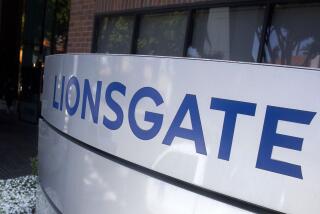Tiny Entertainment Companies Join Forces to Survive
- Share via
It could be a great notion.
Take a batch of the tiny film, video and television companies struggling to survive in Hollywood’s backwater, roll them up into one larger company with a sizable film library, then fire a lot of people to slash overhead. Voila! An entertainment company with a future.
But, can this cobbled-together company fly?
Vancouver, Canada-based Lions Gate Entertainment, the company known for releasing such independent films as “Dogma,” “American Psycho,” and “Gods and Monsters,” is trying to do just that. This week it takes its first step when its board considers buying Trimark Pictures in a proposed $50-million cash-and-stock deal in which Lions Gate would also assume $35 million of the Marina del Rey company’s debt.
The idea--basically a library play much like Artisan Entertainment--is to pick up at least a half-dozen more outfits that may also include Lakeshore Entertainment, Kushner-Locke Co., Harvey Entertainment and Overseas Film Corp. and roll them into one publicly held company whose stock has at least a shot at going somewhere other than down.
Hollywood is littered with the remains of companies such as Carolco Pictures, Cinergi Pictures and Savoy Entertainment that tried to make it on their own. None of them survived the industry’s volatile cycles.
Lion’s Gate has to convince each of its target companies that history only repeats itself and that they have no future alone. Then, says a source, “they need to integrate the companies, lay off tons of people and put together one decent management team. It’s going to be very, very hard.” The source added, “This at least has a 20% chance.”
On their own, these small companies “never get any traction,” says a top industry analyst. As a rule of thumb, companies with a market capitalization of less than $200 million are risky operations that have a hard time competing against the media giants and are of little interest to Wall Street.
Many of these outfits have small libraries of mostly “C” and “D” level movies few people have ever seen. Trimark occasionally releases an acclaimed film such as “Eve’s Bayou,” but it is usually associated with lesser titles such as the recent “Leprechaun 5: In the Hood” starring Ice-T and yet another in a long line of sequels in Charles Bronson’s “Death Wish” series.
Trimark is valued at $40 million, Kushner-Locke at about $30 million and Harvey, $14 million. Lions Gate, which trades on the American Stock Exchange, has a market value of $69 million. Wrap them into one package, and you’ve got some bulk.
The original idea is said to have started with Gordon Crawford, the influential media money manager at Capital Research & Management Co., who also is an investor in Lions Gate. Crawford’s idea intrigued Chase Manhattan Bank, which finances Trimark, among other Hollywood independent entertainment firms. Chase has agreed to give Lions Gate a $200 million line of credit once the company has a deal in hand to acquire the first of the entities it’s targeting, presumably Trimark.
Lions Gate itself was in dire financial straits until January of this year. It had $50 million in badly needed funds tied up in an ill-conceived investment in producer Peter Guber’s Mandalay Pictures. Lions Gate got a 45% stake in Mandalay, but was required to absorb 100% of Mandalay’s non-operating cash losses.
Buying into the consolidation idea, in January, new investors including Microsoft billionaire Paul Allen, German broadcaster Tele-Munchen and SBS Broadcasting sank $33 million into Lions Gate. The company also got new management. Leading the deal was veteran investment banker Michael Burns, co-founder of the Hollywood Stock Exchange Internet site. In March, vice chairman Burns brought in former senior Sony TV head Jon Feltheimer to run the operation as vice chairman and chief executive.
One advantage to Lions Gate being the umbrella company is its Vancouver address. Even though most of its operations are in Los Angeles, the company can tap lucrative Canadian tax credits meant to encourage Canadian productions. Lions Gate also owns a 14-acre studio complex in Vancouver that has some of the busiest sound stages in North America.
Lions Gate is a boutique distributor, picking up edgy, independent films that are often passed on by more established companies such as Walt Disney-owned Miramax Films. The company also has a television division that makes programs such as “VH-1 Confidential” for the music cable channel, “Busted on the Job 4” for Fox, and a two-hour special for ABC on the life of Muhammad Ali. It owns 43% of Montreal-based TV animator Cine-Groupe, whose programs include “Kids from Room 402” for Fox Family Channel.
Lions Gate stock has been erratic as Wall Street worries that the company will overpay for firms like Trimark. Lions Gate stock closed unchanged Monday at $2.38 a share. The stock has recently ranged from a low of $1.50 to a high of $5.
Trimark Holdings closed at $8 a share, down 72 cents in over-the-counter trading.
On takeover speculation, the stock has been climbing recently from a low of $2.38 dollars a share last fall.
More to Read
The biggest entertainment stories
Get our big stories about Hollywood, film, television, music, arts, culture and more right in your inbox as soon as they publish.
You may occasionally receive promotional content from the Los Angeles Times.










